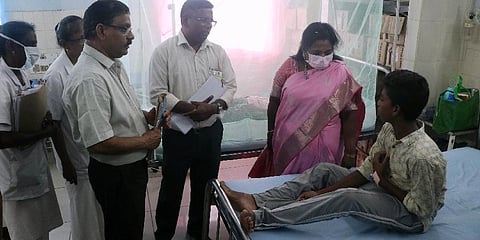

PUDUCHERRY: The two recent deaths due to Dengue in Puducherry have revealed a worrying trend of the disease's rise in the union territory (UT) even before the onset of the northeast monsoon. According to statistics from the health department, a total of 1,175 Dengue cases have been reported till September 13.
This is 383 cases more than the number recorded during the same period last year. The cases of Dengue have also tripled in the last three months, the report added.
As the surge also raises concerns around the potential rise in other vector-borne diseases such as malaria, chikungunya, Japanese encephalitis, and elephantiasis, the Puducherry government on Thursday exhorted residents to seek immediate medical attention if they experience fever with dengue symptoms.
Lt Governor Dr Tamilisai Soundararajan inspected the facilities for Dengue treatment at the Indira Gandhi Government General Hospital and Post Graduate Institute (IGGGHPGI), and said that private hospitals have been directed to go for ELISA test to detect Dengue in symptomatic patients. Tamilisai noted that both patients who died had delayed in seeking treatment or a detection test. All hospitals have been asked to stock blood as infusion may be required, she said.
Chief Minister N Rangasamy said government hospitals in Puducherry are equipped to provide treatment for Dengue. He also urged people to be aware of the symptoms and seek medical attention timely. He said health inspectors, health assistants, malaria field workers, and Asha workers are working in primary health centres in areas most affected by Dengue. Intensive mosquito control operations are on and fever-affected areas are being fumigated to curb the spread. Residents are advised to take precautions such as placing window nets and using mosquito repellents, including herbal options. Additionally, proper disposal of human-made water reservoirs (DSR) is crucial in preventing mosquitoes from breeding.